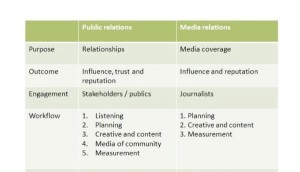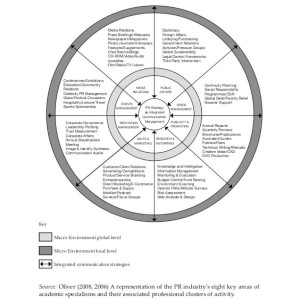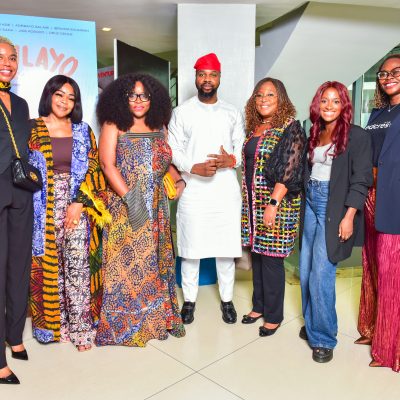f I got 1,000 Naira every time someone told me with flourish and certainty that Public Relations in Nigeria is so bad, it is not worth being called its name, I would be a millionaire. Or so.
The bottom-line is there are too many people who think that Public Relations as it is practiced in Nigeria is mostly rubbish.
I have heard it from all kinds of people, especially when they come to you and hope that you are the Daniel come to judgement: to save them from all the demon spirits that have been stealing their monies in the name of Public Relations.
As far back as eight years ago when I worked on the ‘client side’ as a manager for media relations at Virgin Nigeria eight years ago, it was sport to moan about how bad PR is in Nigeria. And even now, you’ll see random tweets from some university student declaring with (annoying) authority that ‘PR in Nigeria is shit’.
Yes it’s annoying, but is it a fair point?
The sad truth is there is a good case to be made that the majority of what passes for the practice of public relations in Nigeria is badly cooked bush meat.
All of these points will be dealt in fuller detail in subsequent articles, but I will share 13 reasons why this is the case.
Long term
PR is not supposed to increase your customers or buyers, at least not immediately. This is, of course, not a Nigerian problem alone. There is a global revolt against the idea that PR, ab initio, isn’t concerned with increasing your customers or buyers, at least in the near term. Here is the truth that many won’t tell you – PR isn’t supposed to do that. And that’s why for many new businesses without strong cash flows, my first advise is always ‘Don’t do PR, go focus on other aspects of the marketing value chain, spend on advertising/ Until you have a reputation to protect, don’t spend money on managing your reputation’.
Heresy. But it’s the way it is.
Practitioners promise everything
Poverty is a major problem. People who want a client – any client – at any cost, will promise them customer acquisition, metrics that wont wash, and conversions that are impossible. Client expectations are raised, practitioner struggles and fails. The vicious cycle never ends. Painfully aware of the limits of the form, rather than embrace as the beauty of its purpose, practitioners spend time insisting that PR can do things it doesn’t for, and wasn’t designed to do.
The nature of PR itself
It’s difficult to define and streamline because it’s so wide – there is media relations, there is crisis management, there is issues framing, there is story building, events, editorial coordination, conversation management, government relations, stakeholder management community relations, influencer relations… the whole gamut. Each of these is a full time job on its own (and in many organisations, they are), but because they all come under one umbrella it becomes difficult to manage, to handle effectively and to track results.
The wideness makes it unwieldy, and therefore many of its practitioners are unable to get a hang of its full dimensions and to wrestle them into an organised goal.
Of course, it doesn’t help that when – even PR practitioners – actually refer to the art of PR, they actually are only narrowly referring to the field of media relations.
Measurement
If you work in PR, you know that when clients ask for value, many people still whip out Advertiser Value Equivalents which essentially means they budget for how many column inches you got and cost based on the advertising value. This gets a very bad rap.
I am in a minority that feels the rap it gets is unfair; but, I can understand why.
An advert makes an emotive pitch with a call to action. PR succeeds exactly because it has no obvious call to action. Meaning it’s not supposed to lead to customers tomorrow or today. Its supposed to help you build a force field of goodwill that you could convert into clients (I inform clients that you need a 6 month to one year period to measure qualitatively). How do you even speak all this English to somebody who wants results he or she can track? There is a reason why PR is only deeply appreciated where there is a crisis, and someone ‘kills’ a story or develops a storyline that replaces the negative with the positive.
Communication and PR interchanged
Everything is called PR in Nigeria. You face a communication challenge and someone says ‘Your PR is bad’. Everything, advertising, lobbying, experiential marketing, brand building, media planning, media buying, even out-of-home advertising (billboards, etc) is referred to by a disengaged public as PR!
And so when you take a discipline as wide as Communication and give it to a young boy from university under PR, then blame PR for your own inability to align functions, the results can only be obvious. No, that young man cannot help you with your media planning to get your advise in the first 10 pages of Thisday. That’s not PR. That’s an actual profession that up to and above 50 people are employed to handle in many agencies across Nigeria.
Low bar for entry
Speaking about that young boy from school. The fact that PR – like journalism, like being a pastor – is something basically anyone can claim to do in a market where laws and regulations aren’t obeyed makes it a bigger issue than most.
Since essentially anyone can practice PR (and for good reason, this isn’t exactly brain surgery, pretend as practitioners might), and regulation is weak, the door is wide open.
So people spend their lives working with quacks and getting disappointed and then using those narrow experiences to tar an industry which has incredible professionals doing important work.
Bad product
This requires a full article, and I am doing that soon. But sometimes the problem is that PR practitioners just don’t tell the client the, uhm, truth.
PR is not a Band-Aid. There are some things it cannot solve. A consistently bad product is one. Many times I have had to reroute clients to the product strategy division of our company because what they needed wasn’t PR.
Last year someone came to our company with a brief for a mobile-based product. We refused to move, insisting to him that what he had was a faulty product. Until he could get around the ‘hard thing’ i.e. the fact that Nigeria’s data limitations make his product difficult to scale, no amount of communication would move the needle. He didn’t move. Neither did we.
In a reputation industry, our reputation for good advice is important.
Retainers are bad or non-existent
When we get new clients, especially non-corporates, I do my best to send them away by telling the truth: our costs are high. Why? Well, because they should be.
PR is intellectual work. It takes time, it takes people and it takes planning. If you can’t pay for the time and the brain power, we won’t be able to provide our best work. Don’t pay an intern’s fee to a professional.
Retainers are important and they are not the same as the costs of actual doing the work. Retainers are like paying a doctor for his time, then activation costs are like going for surgery. If you don’t pay well for consultation, the quality of advice you get is likely to be uninspired.
Many times I have told clients: it is better to pay well, so that the agency is comfortable enough to give you advice that won’t have you spending money. Unfortunately, because ‘country hard’, too many agents are refusing to be properly retained, either monthly, per project or as percentage of cost. The result is a crisis of under-performance.
An absence of strategy
Actual Public Relations is heavily dependent on strategy. Unfortunately, this is a country where people don’t respect strategy and the intellect.
You ask people to give you one week to think through the strategy or to focus group the product and they think you’re being dramatic. But without the data and the structured information needed to make proper decisions on narratives, how can one implement properly?
Our country values ‘doing’ over ‘thinking’ and so the kind of PR we are confronted with is the type I call ‘2 tweets and 1 press release’ where a person thinks all you need to get column inches is to write any press release or tweet without regard to context, sensibilities, segmentation, continuity, even tone.
Too many professionals don’t spend time working through the process to the outcome and so they are unable to they create a value chain that ensures those results precisely as promised.
Public Relations is much more than press releases.
Not everyone needs PR consultancy
Don Jazzy doesn’t need a PR consultant, at least not 90 percent of the time. When he had that silly fight with Olamide? Sure. He needed it – the crisis management part of it. But generally, day to day, he does an excellent job managing his reputation, his fans, everything.
A PR person has no real value proposition to a man who already excels at reputation management. And so promising things that are not possible leads to a disappointed client. Of course, if Don Jazzy decided he wanted to become a global brand with global communication, that’s another angle. But to speak to these fans in these markets? Let’s tell ourselves the truth. Like Donald Trump, not even an error in his press release will make a dent in the things that matter most to him – fans.
PR is a lot of work
PR is easy to get into but is hard to get done. The best PR combines the best writing, with the best content curating with the best strategy with the best on-the-ground execution, with the brightest copy talent and a whole range of skills. How many people do you know in PR who have a skill that’s bigger than the ability to place a story in the papers?
People who don’t understand that this is a discipline studied up to PhD level can’t wrestle with the effort to be applied.
Everything has changed
PR, like everything else in the world linked to the media, has completely changed. Can you imagine anyone trying to run a profitable radio station with the exact same equipment as a decade ago?
Unfortunately, because much of the resources needed for PR is intellectual property – things we cannot see – people don’t understand that the thinking has to change because the process has changed.
Of course, it’s silly to say PR is dead. Just like it’s silly to say TV is dead, or newspapers are dead. Nothing ever dies. Things evolve. Magazines move online, radio moves to smaller spaces, PR has moved to disintermediated platforms. But they evolve, they move in tone, sensibility and affect. And so most practitioners. Many practitioners don’t understand it, because we live in a society where knowledge transfer is unforgivably slow. Hence the speed to set up Digital Agencies, where what we need are PR services that are expanded to accommodate the demands of social PR.
Nyama nyama
PR will certainly be endangered specie in a society where everyone likes nyama nyama (rubbish), ozugbo ozugbo (quick, quick) wuruwuru to the answer. A profession that requires strategy, thought, deliberation and time to deal, to build, to achieve desired outcomes will always face a reputational crisis in a country where values and processes are broken down and no one thinks long term or understands the value of strategic management.
This is the market we live in, this is the challenge we face, and this is the demon both clients and service providers must kill if they truly desire excellence that produces results.
—–
It is important for clients and agencies to confront the realities of why there are so many unhappy clients and unhappy transactions in a practice that’s supposed to lead to trust and to love.
It is a tragedy that because of these cocktail of reasons, a distinguished procession can’t be well regarded, and many PR professionals are treated with disrespect and disdain.
It is possible to give clients joy, but first you must confront the brutal facts of the things that can steal their joy.
Tell them the truth about these issues. And can we try something radical? Work with them together to solve these problems.
We have plenty of work to do.






